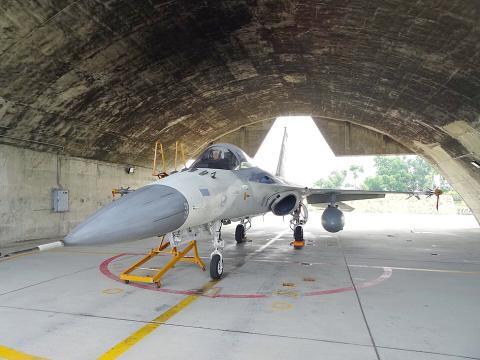The military is considering stationing a squadron of Indigenous Defense Fighter (IDF) jets at Penghu County’s Magong Airport for year-round patrol duty in light of China’s unilateral decision to open new commercial flight routes in the Taiwan Strait, a source said on Friday.
Strong northeasterly monsoon winds in the area during winter can create unfavorable conditions for light fighter planes, such as IDF jets, which is why the squadron is normally based in Penghu from April to October, said a senior official, speaking on condition of anonymity.
Due to its proximity to the Chinese coast, the fighter squadron would be called on first if the Chinese People’s Liberation Army Air Force were to make a sudden deployment, the official said.

Photo: Su Fang-ho, Taipei Times
A Republic of China Air Force officer familiar with combat readiness and the deployment of the nation’s air force to Penghu commented anonymously, saying that year-round deployment of IDF jets — the Hsiung Ying (雄鷹, or Goshawk) or C/D models — to Penghu is pending further assessments.
The squadron is to be temporarily deployed to Penghu, because route M503 near the median line of the Strait poses a potential threat to the nation’s air defense, but the ministry is still debating the feasibility of basing the squadron in Penghu, the official said.
The National Security Council on Friday held a meeting to discuss the effects of China’s decision to open route M503 and other connecting routes to northbound commercial flights.
The council concluded that the move contravenes the 2015 agreement between Taiwan and China that opened route M503 to southbound commercial traffic.
It has instructed the Ministry of Foreign Affairs and the Ministry of Transportation and Communications to seek the support of European nations and the US over the matter, while lodging a protest against China with the International Civil Aviation Organization, sources said.
The Ministry of National Defense was asked to offer viable reactionary measures to effectively strengthen aerial defenses over the Bashi Channel, the sources added.
The defense ministry would step up alert and information-gathering capabilities over the Strait, with any incursion of Chinese planes over the median line to be intercepted, warned and driven back over the line, the sources said.
Additional reporting by CNA

CHAOS: Iranians took to the streets playing celebratory music after reports of Khamenei’s death on Saturday, while mourners also gathered in Tehran yesterday Iranian Supreme Leader Ayatollah Ali Khamenei was killed in a major attack on Iran launched by Israel and the US, throwing the future of the Islamic republic into doubt and raising the risk of regional instability. Iranian state television and the state-run IRNA news agency announced the 86-year-old’s death early yesterday. US President Donald Trump said it gave Iranians their “greatest chance” to “take back” their country. The announcements came after a joint US and Israeli aerial bombardment that targeted Iranian military and governmental sites. Trump said the “heavy and pinpoint bombing” would continue through the week or as long

TRUST: The KMT said it respected the US’ timing and considerations, and hoped it would continue to honor its commitments to helping Taiwan bolster its defenses and deterrence US President Donald Trump is delaying a multibillion-dollar arms sale to Taiwan to ensure his visit to Beijing is successful, a New York Times report said. The weapons sales package has stalled in the US Department of State, the report said, citing US officials it did not identify. The White House has told agencies not to push forward ahead of Trump’s meeting with Chinese President Xi Jinping (習近平), it said. The two last month held a phone call to discuss trade and geopolitical flashpoints ahead of the summit. Xi raised the Taiwan issue and urged the US to handle arms sales to

State-run CPC Corp, Taiwan (CPC, 台灣中油) yesterday said that it had confirmed on Saturday night with its liquefied natural gas (LNG) and crude oil suppliers that shipments are proceeding as scheduled and that domestic supplies remain unaffected. The CPC yesterday announced the gasoline and diesel prices will rise by NT$0.2 and NT$0.4 per liter, respectively, starting Monday, citing Middle East tensions and blizzards in the eastern United States. CPC also iterated it has been reducing the proportion of crude oil imports from the Middle East and diversifying its supply sources in the past few years in response to geopolitical risks, expanding

Pro-democracy media tycoon Jimmy Lai’s (黎智英) fraud conviction and prison sentence were yesterday overturned by a Hong Kong court, in a surprise legal decision that comes soon after Lai was jailed for 20 years on a separate national security charge. Judges Jeremy Poon (潘兆初), Anthea Pang (彭寶琴) and Derek Pang (彭偉昌) said in the judgement that they allowed the appeal from Lai, and another defendant in the case, to proceed, as a lower court judge had “erred.” “The Court of Appeal gave them leave to appeal against their conviction, allowed their appeals, quashed the convictions and set aside the sentences,” the judges